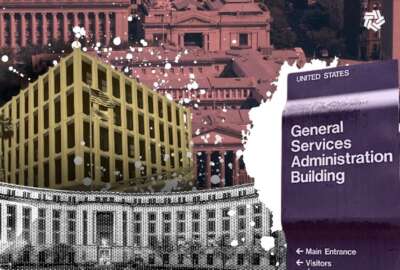Hubbard Radio Washington DC, LLC. All rights reserved. This website is not intended for users located within the European Economic Area.
OPM defends rule to hamper Schedule F’s return, backs telework amid return to office push
Acting OPM Director Rob Shriver told lawmakers the return of Schedule F would have a “chilling effect” on career federal employees.
The Office of Personnel Management is defending a recently finalized rule meant to prevent the return of Schedule F — a Trump-era policy that made it easier to fire career federal employees in policymaking positions.
OPM’s acting director told the House Oversight and Accountability Committee that the re-emergence of such a policy would undermine civil service protections, and return the federal workforce to a 19th-century “spoils system” with major turnover.
Acting OPM Director Rob Shriver told lawmakers on Wednesday that the return of Schedule F would have a “chilling effect” on career federal employees, and prevent them from providing candid feedback on policy matters.
The return of Schedule F under another Trump administration or any other presidency, he added, would also make it harder for agencies to recruit and retain qualified employees.
“If we were to send a message to the public that you no longer are prioritized in the federal government based on skills, abilities, knowledge that you have, but instead that you’re doing to be valued based on some other non-merit factor, I think the human capital challenges that the federal government already faces will be dramatically exacerbated,” Shriver said.
OPM finalized a rule last month reinforcing civil service protections for career federal employees, and hampering the return of Schedule F, if former President Donald Trump wins the presidential election this November, or in any future administration.
“It is critical that federal workers have the protections so that they are able to offer their honest advice, their honest opinions, even when unpopular — or perhaps even when their opinion based on their expertise may be something that the leadership would disagree with,” Shriver said.
“Leaders always have the opportunity to make the decision that they need to make, and then federal employees need to follow and implement it. But it would do great damage to our system and a disservice to the American people, including to safety and national security if our experts were chilled and their ability to bring their honest analysis to their leadership,” he added.
Democrats on the committee are looking to take OPM’s final rule one step further, and pass legislation that would codify its contents into law.
But Republican lawmakers said the return of Schedule F would prevent career federal employees from undermining the policies of any administration — including the Biden administration.
Rep. Andy Biggs (R-Ariz.) pointed to recent cases where federal employees have voiced opposition to President Joe Biden’s policies on the war between Israel and Hamas.
Dozens of federal employees gathered on May 15 in front of the White House to protest the Biden administration’s stance on the War in Gaza. The government workers came together on Nakba Remembrance Day, which marks the mass Palestinian displacement in 1948, with the emergence of the state of Israel.
The government workers are part of a coalition called “Feds United for Peace,” and are calling for an end to the government’s support of Israel.
“This is staff all across agencies of the federal government, where people were walking out, organizing letters of protest against Biden policy, Biggs said. “They’re formally engaging in opposing this administration’s policy, which is OK for us, because we’re elected officials. But how’s that OK for federal employees?”
Shriver said federal employees have to follow the rules around taking annual leave and comply with the Hatch Act guidance when engaging in any political activity.
“OPM sets the rules, and then agencies follow and implement the rules. And with respect to questions around leave, or the Hatch Act, those are always matters that are taken up as a management matter at an agency,” he said.
After getting questions about federal employees’ ability to discuss the Israel-Hamas War at work, the Office of Special Counsel clarified last November that feds can share their opinions while on the clock, as long as it is not a statement for or against a political party.
To avoid legal trouble, leaders of Feds United for Peace also encouraged federal employees not to use any government property or resources while planning protests.
Rep. Pete Sessions (R-Texas), chairman of the government operations and federal workforce subcommittee, asked OPM what it’s doing to “ensure that federal employees are not, have not, and will not seek to undermine a president — in either party —for their agenda, simply because they disagree with it.”
“We’re talking about civil service employees who are holding hostage not only key initiatives, but the administration they serve,” he said.
Shriver said a return to Schedule F would be a “fundamental transformation” of the federal workforce.
“That takes us back to the 1800s, when we had a spoils system, when there was massive turnover among federal workers with any new election that changed. The people that were hired were hired based on their loyalty to that particular candidate. And I think that unchecked, a policy like Schedule F could open the door to a return to that,” he said.
Shriver told lawmakers that about 16,000 to 17,000 federal employees are fired or “removed for cause” each year — less than 1% of the 2 million total federal workforce.
Rep. Gerry Connolly (D-Va.) said the introduction of Schedule F under the Trump administration sought to turn the nonpartisan civil service “into an army of ill-prepared and unqualified loyalists.”
Connolly introduced the Saving the Civil Service Act, which would require any president to seek congressional approval before significantly expanding the excepted service. The bill has 36 cosponsors, including several Republicans.
“While I’m grateful that the latest OPM rule to reinforce and clarify protections for the nonpartisan career civil service is a great first step, the civil service will not be protected from reclassification, unless it’s codified into law, and executive order can be overturned,” Connolly said.
Connolly said his bill passing and becoming law would ensure that “no future president irrespective of party can with the stroke of a pen fire tens of thousands of federal employees who are currently protected under the law.”
The National Active and Retired Federal Employees Association (NARFE) told the committee in a letter that it “strongly urges” lawmakers to reject attempts to grant the executive branch the ability to bypass civil services rules through the creation of a broad new excepted service category, as seen with Schedule F.
“Our federal workforce should be staffed with well-qualified individuals, not those who are placed into service due to political connections,” NARFE National President William Shackleford wrote in his letter.
NARFE says it supports the Saving the Civil Service Act, “to prohibit a return of Schedule F or similar policies.”
“Overthrowing the merit system is poor policy-making, opening the return of the spoils system. Instead, NARFE urges this committee to find common ground on issues of specific concern, particularly those involved with recruitment and retention of federal employees, so the federal government can meet the demands of the future,” Shackleford wrote.
Feds returning to office faster than private sector
Committee Republicans also urged OPM to hasten federal employees’ return to the office.
“This president has given direction that it’s okay for federal workers to stay at home,” Sessions said.
But Shriver pointed to a recent report from the nonpartisan Congressional Budget Office report showing that federal employees are returning to the office at a faster pace than the private-sector workforce.
Shriver said that more than half the federal workforce — about 54% of federal employees — don’t telework at all. The remaining 46% are working a mix of in-office and telework days.
“For many, many years prior to the pandemic, the federal government was able to have people that could spend some of their time working in an alternative location,” Shriver said.
Meanwhile, Shriver said OPM has provided training to over 10,000 federal managers and supervisors about managing employees in a hybrid work environment.
The Biden administration is calling on agencies to bring their employees into the office at least 50% of the time.
With the shift to a hybrid workforce model, Shriver said OPM has let go of some of its leased office space around the country, but “we have more work to do there to get to a steady state.”
“These are the issues that we are all wrestling with today — is how the intersection of the work arrangements that are in place now measure up to our footprint,” Shriver said.
The National Treasury Employees Union, in a letter submitted to the committee, said telework remains “essential for the federal government to recruit and retain the best and brightest to provide quality services to the American people.”
NTEU National President Doreen Greenwald told lawmakers gave examples of how telework-eligible vacancies attract more applicants, and that telework policies are helping agencies save money on real estate.
The union, she added, opposes “arbitrary one-size-fits-all limits on telework,” and urged OPM to collect data on telework’s effectiveness, develop best practices and assist management with training on supervision of teleworkers.
“Such initiatives are essential to well working telework programs and NTEU fully supports methodical and thoughtful data collection and program review,” Greenwald wrote.
Copyright © 2024 Federal News Network. All rights reserved. This website is not intended for users located within the European Economic Area.
Jory Heckman
Jory Heckman is a reporter at Federal News Network covering U.S. Postal Service, IRS, big data and technology issues.
Follow @jheckmanWFED





